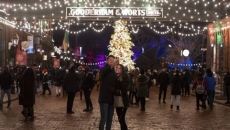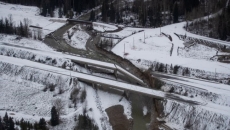The discovery of unmarked graves at a former residential school in the B.C. Interior and the countrywide awakening it set off have been chosen as Canada’s news story of the year by editors in newsrooms across the country.
There were 38 editors in the annual Canadian Press survey who picked the grim discovery at the former Kamloops Indian Residential School as the most compelling and deeply revealing story of 2021. That compared with 31 votes for Canada’s COVID-19 vaccine rollout and 13 for climate change and B.C. weather that saw massive fires in the summer and floods in the fall.
“The announcement of unmarked children’s graves shook most Canadians to their core, even if this information was not new to many First Nations people,” said Christina Spencer, Ottawa Citizen editorial pages editor.
“Non-Indigenous Canadians now want to know more about the ‘hidden’ history of this country and that can only be a good thing.”
The story broke last May when the Tk’emlups te Secwepemc Nation in Kamloops said a section of land was searched at the former school with ground-penetrating radar and found what were believed to be the remains of up to 215 children. Tk’emlups te Secwepemc Chief Rosanne Casimir said then that they had "a knowing" in their community that the missing children were undocumented deaths.
“Some were as young as three years old,” said Casimir in a statement. “We sought out a way to confirm that knowing out of deepest respect and love for those lost children and their families, understanding that Tk’emlups te Secwepemc is the final resting place of these children."
The Kamloops Indian Residential School operated between 1890 and 1969, when the federal government took over its operations from the Catholic Church and ran it as a day school until it closed in 1978.
The Truth and Reconciliation Commission’s 4,000-page report detailed mistreatment at Canada’s residential schools, including emotional, physical and sexual abuse of children, and at least 4,100 deaths at the institutions. Canada had more than 130 residential schools, with the last one closing in 1996.
Even with that commission finding of thousands of deaths at the schools, many editors who participated in the survey said the discovery of the unmarked graves served as a chilling, consciousness-raising event about Indigenous struggles in Canada.
“The initial discovery of 215 unmarked graves at a former residential school in Kamloops seemed to shake the Canadianness out of Canada,” said Dawn Walton, managing editor at CTV Calgary.
“Despite all the work of the Truth and Reconciliation Commission, it was this revelation, and subsequent discoveries of other unmarked graves, that really made Canadians stop and recognize there is more yet to be done.”
The story made headlines around the world. Across the country, other First Nations began looking for lost children using the same technology.
Chief Cadmus Delorme of Saskatchewan’s Cowessess First Nation said ground-penetrating radar used near the Marieval Indian Residential School discovered 751 unmarked graves, of which 300 have now been identified.
Searches with ground-penetrating radar are also underway in Brantford, Ont., at the former Mohawk Institute Residential School, and in Williams Lake, B.C., at the former St. Joseph’s Mission Residential School.
Flags were lowered for months across Canada in memory of the lost children and the residential school survivors.
Prime Minister Justin Trudeau faced harsh criticism for travelling to Tofino, B.C., for a family vacation on the first National Day for Truth and Reconciliation in September despite receiving an invitation from Casimir to visit the former Kamloops residential school site.
Trudeau then visited in October, where he apologized, saying his vacation decision was a mistake he regretted.
Casimir described the reaction of Canadians to the discovery of unmarked graves as one of immense importance to the school survivors who feel the darkness of their past can no longer be hidden or denied.
“It has been fully overwhelming,” said the chief last June in a field near the residential school. “That said, on behalf of Tk’emlups te Secwepemc, I want to express my deepest gratitude for the outpouring of support.”
Garry Gottfriedson, a former Kamloops residential school student, said the discovery of the unmarked graves is bringing to the surface long-buried truths about the treatment of Indigenous Peoples that Canadians now want to explore.
“That shows the spirit of true Canadians that they really want to learn,” said Gottfriedson, whose poems, songs and books explore Indigenous identity. “They really don’t want to hide anything anymore.”
Canada’s editors described the discovery of the unmarked graves as a moment of change in the country, much bigger than just a news story.
“The children who didn’t return home forced Canada to face its history,” said Sara Hyde, executive producer at CKNW Vancouver.
“It has not only changed the way we think about our history, but it is changing how we think about our reality and will shape political decisions going forward.”






